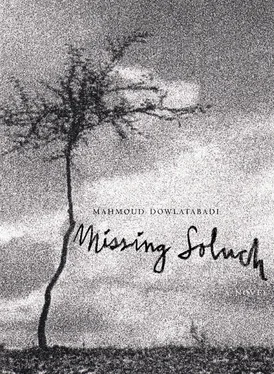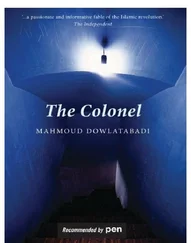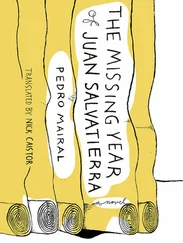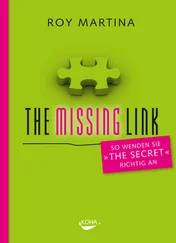“May you have a long life, Ali!”
Ali Genav didn’t know what the proper reply to the Molla’s statement was, so he said, “May God grant you a long life as well!”
Hajj Salem added, “May God give everyone the grace of patience!”
Ali Genav nodded his head and stole a glance at Mergan, who was walking alongside the men with her head lowered. He made his way beside her and said under his breath, “It seems they want something for their prayers, no?”
Mergan said, “You need to give the Molla and Hajj Salem something each. You should probably also offer Ghodrat’s father something …”
“How much for each?”
“You know best.”
Ali Genav put his hand in his jacket pocket and moved over alongside the village Molla. Mergan watched as he slid a bill into his hand, before approaching Hajj Salem, who took the money but also bargained to be able to visit the baths with his son. He kept up his prayers, saying, “May God have mercy on that poor woman. She was good and God-fearing. May light always shine on her grave. No one could match her in her desire for good. I saw her many times give half of her dinner bread to others less fortunate. May she be in heaven with Fatima, the daughter of the Prophet himself!”
“God willing. God willing.”
“From God’s enlightened view, no good deed will be hidden, Ali. Do you know that providing for the washing of this poor creature, my Moslem, is itself a deed that will be rewarded in the hereafter, my brother? He will pray for you. I’ll tell him to also pray for your deceased mother. The prayers of the innocent are always answered. This creature of mine is himself sinless, Ali dear!”
Ali Genav replied, “Very well, tomorrow morning. Both of you come to the baths tomorrow.”
They entered the village. The Molla approached Ali and said, “If there’s to be a mourning ceremony …”
But Ali Genav didn’t listen. Hajj Salem stood on the incline beside the alley and raised his cane in salutation of Ali Genav, saying, “Until tomorrow morning, then! May you stay young and have a long and blessed life!”
He waved his cane in the air and walked away. Moslem followed his father. The Molla also changed direction. Morad said goodbye and Ghodrat’s father looked at Ali Genav, who said, “You also come to the baths, and bring Ghodrat with you.”
“Goodbye!”
They left. Ali Genav walked shoulder to shoulder with Mergan.
“What cheek! They expect a mourning ceremony? I’m supposed to give my daily bread to this and that person for what? So they can say a prayer? Better if they don’t! What sins had that poor old woman committed for us all to want to pray for her soul?”
Mergan didn’t say much. She didn’t feel close to Ali Genav, even though he had now adopted an intimate tone with her. But Mergan herself didn’t sense any intimacy between them.
“Now I need to take that woman to town, put her in a hospital. I’m fed up with her crying. I’ll find someone and get the papers. But this damn donkey’s chosen a bad time to get sick!”
They reached their alley. Mergan turned to go toward her own home, but Ali Genav blocked her way, insisting that she come to his home first.
“If nothing else, let me give you a piece of bread after all. My home is yours as well. Come, let’s go see how Raghiyeh is doing.”
Raghiyeh was lying in the same place. Her eyes were shut and she was moaning softly. It seemed as if she’d fallen asleep just after dawn. Mergan sat by the door and Ali Genav brought a few pieces of bread, setting them on the edge of her chador.
“Dry your mouth with these. If you want, take them to share with your children. Today, I’ll take Raghiyeh to the hospital, somehow.”
Raghiyeh opened her eyes and, speaking in broken breaths between her dry lips, said, “No … No … I won’t go … to that place … I’ll die … I’ll die!”
Ali Genav growled, “Damn you. The right place for a sick person is in the hospital. What do you mean, you’re dying?”
“No! Leave me here. Let me die right here under my own roof.”
Not listening to his wife any longer, Ali Genav filled the pockets of his cloak and jacket with dry bread, breaking some into small pieces and putting them in his mouth. He left the house and went directly to his donkey. The animal was still shaking and its muzzle was wet from its runny nostrils. He ran his hand across the patchy, dung-stained hide of the beast. He pulled off bits of manure that were clinging to the hairs on its hips and scratched its belly with his fingernails before saddling the animal and putting its bridle on. He suddenly remembered that he still needed to take the coffin and put it in its usual place in the corner of the mosque’s courtyard. But it was too late to take care of that. He had to focus on this task first. The stable door caught his eye; he took the door off its hinges and set it on the ground by the wall in the yard. He swallowed the bread he had been chewing, and he put another piece in his mouth before re-entering the house. He took his mother’s old mattress outside and laid it on the stable door. He stood over Raghiyeh and said, “If you have some old sheets, best wrap them around yourself!”
Raghiyeh didn’t respond. Helped by Mergan, Ali Genav began wrapping his wife with sheets. They put a blanket around her body and he told Mergan to grab her under the arms. Raghiyeh was not heavy; she, too, was as light as a strand of hay. They took her outside and lay her on the detached stable door. Ali Genav ignored his wife as she moaned. He brought some cord out from the pantry room. He led the donkey out of the stable and into the alley. He went over to Raghiyeh and wrapped the cord around her and the door, and with Mergan’s help he placed her and the door onto the back of the donkey. Then they tied Raghiyeh and the door to the animal. Mergan brought out Ali’s cloak and held it in her hand. He ran back into the house and then returned a moment later. He handed the house key to Mergan, adjusted his wallet in his side pocket, took the cloak from Mergan’s hand, and said, “Tell Abrau to keep an eye on the water boiler. You also keep an eye on his work. If I end up staying in town tonight, you can light the water boiler and have Abrau keep an eye on it tomorrow. This evening, you and Hajer both go and use the baths. Also, tell Abrau that when Hajj Salem and his son come to use the baths tomorrow, don’t ask them to pay. I won’t ask anything more of you. If I don’t come back tonight, you can bring Hajer and sleep here. Did you take the bread?”
“I took it.”
“Good. Goodbye then. I’ll take her and somehow have her hospitalized!”
Ali Genav prompted the donkey, and Mergan turned to go home.
Abbas was sitting on the edge of a ditch by the house and was washing coins in a ceramic bowl. The bowl was full of water, and the coins had settled on the bottom, although Abbas was still fingering them. Mergan passed her son and entered the house. Hajer was napping by the oven. The fire in the oven had burned to ashes. Mergan sat by the oven and set a piece of bread on the ground. Abbas entered the room, still bent over by some residue of pain. His fist was full of coins, which he was counting. It seemed as if he had counted them several times already. When he reached the oven, his knees folded and he sat down. He took some bread and broke off a piece of it with his teeth.
“I think two five-qeran pieces are still inside me!”
Abbas had taken his father’s old sack, Hajer had her mother’s chador, and Abrau had a bag made of bits of rags sewn together.
The two brothers walked shoulder-to-shoulder, and their sister followed behind them. They were heading to the fields. It was nearly the holiday of Nowruz — the first day of the New Year and the first day of spring — and the fields were turning green. The sun’s rays were growing warmer, warming people’s hearts everywhere. Feet were no longer stung by the coldness of the earth. Faces were no longer clouded over, at least not as much as they once had been. The sky was wide and open, no longer low and imposing. The days felt light, the fields and prairies seemed wider — all of which imprinted itself onto the hearts of Soluch’s children. Their hearts felt brighter. It was spring’s luminous return. People walked with less fear, although not fearlessly. Heads were raised higher, raised in the wind. Spring and youth! The drunken air of spring, raising heads once worn raw. Eyes no longer seemed drawn in, expectant, but were open, brighter, shining. The playful games of spring flickered in people’s eyes, just as gazelles frolicked in the spring-struck fields.
Читать дальше












